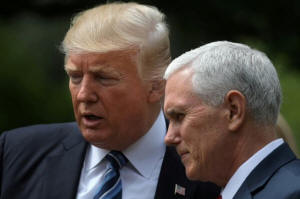|
Vice President Pence's hawkish tone on
Russia contrasts with Trump approach
 Send a link to a friend
Send a link to a friend
 [August 04, 2017]
By Roberta Rampton [August 04, 2017]
By Roberta Rampton
WASHINGTON (Reuters) - When President
Donald Trump scolded U.S. lawmakers on Thursday for clamping down on
Moscow with new sanctions, his message clashed with the one that Vice
President Mike Pence pushed during a four-day trip this week to Eastern
Europe.
As he toured Estonia, Georgia and Montenegro, Pence said the sanctions
passed overwhelmingly by Congress would send a unified message to Russia
that it must change its behavior.
Trump, by contrast, took to Twitter to complain that the sanctions
legislation, which he grudgingly signed, would send U.S.-Russia
relations to "an all-time & very dangerous low."
While some Republicans played down the divergence, critics said it
exemplified an incoherent policy that would unsettle allies and fail to
placate Moscow.
“There are some policies where a good cop/bad approach can work," said
Michael McFaul, a U.S. ambassador to Russia under former Democratic
President Barack Obama.
But McFaul added that in the case of the Trump administration's policy
toward Russia, Moscow was likely to view the mixed signals as a sign of
policy disarray.

If Trump continues to want improved relations with Russia, "he's not
achieving his goal," McFaul said.
The Republican president has repeatedly said he wants better ties with
Russia. But the country has loomed large over the first six months of
his administration as a special counsel and U.S. congressional panels
investigate allegations Moscow meddled in the 2016 U.S. election to help
Trump and also examine any potential role by Trump aides.
Moscow denies any meddling and Trump denies any collusion by his
campaign.
After Congress passed the sanctions legislation with a large enough
margin to override a presidential veto, Trump signed it on Wednesday but
criticized it as infringing on his authority and said he could make "far
better deals" with governments than Congress could.
As a countermeasure to the sanctions, Russian President Vladimir Putin
called for reducing the staff of the U.S. diplomatic mission by 755
people and for the seizure of two properties near Moscow used by
American diplomats.
'SMALL AND BULLYING LEADER'
Jarrod Agen, deputy chief of staff to Pence, insisted that Trump and
Pence were “completely aligned” on Russia.
“It was the president’s decision to send the vice president to the
region. It was the president’s decision to deliver the message that the
vice president delivered,” Agen told Reuters.
He added that Pence and Trump spoke every day during his trip and
sometimes multiple times a day.
The disconnect between Pence and Trump on Russia is an anomaly. Pence
usually goes to lengths to emphasize his loyalty to his boss and to
downplay any differences.
Their different tone on Russia dates back to the U.S. presidential
campaign. While Trump often praised Putin, Pence called the Russian
president a “small and bullying leader” during a vice presidential
debate last October.
[to top of second column] |

President Donald Trump and Vice President Mike Pence attend a
National Day of Prayer event at the Rose Garden of the White House
in Washington, DC, U.S. on May 4, 2017. REUTERS/Carlos Barria/File
Photo

During his trip this week, Pence condemned Russia for its
"occupation of Georgia's soil" as he spoke to U.S. and Georgian
troops engaged in joint exercises only 40 miles (64 km) away from
Russian troops in South Ossetia.
In Montenegro, Pence accused Russia of trying to "destabilize" the
western Balkans - a message criticized by Moscow.
Russia’s Foreign Ministry said it was “regrettable to note that
Washington is sliding ever deeper into the primitive ideology of the
Cold War era, which is completely detached from reality."
Traditional Republican conservatives - who favor a hard line on
Moscow - have taken some comfort in Pence's message, as have foreign
leaders concerned about the impact of a rapprochement between Trump
and Putin.
“What he (Pence) is saying is good and helpful and should be the
policy of the Trump administration – and so for those of us who want
it to be that way, we’re happy to embrace it,” said Danielle Pletka,
senior vice president for foreign and defense policy studies at the
American Enterprise Institute.
“None of us know what Donald Trump thinks in his heart of hearts
about Russia,” Pletka said. But she added: “If (Trump) were not
comfortable with Pence making this trip, Pence would not be making
this trip.”
Republican Bob Corker, chairman of the Senate Foreign Relations
Committee, said he would not “read a lot” into the different tones
struck by Pence and Trump, although he welcomed Pence’s trip to the
European countries.
Corker described Pence as the administration’s “ombudsman” on policy
and said Defense Secretary Jim Mattis, Secretary of State Rex
Tillerson and Trump's national security adviser, H.R. McMaster, were
key to developing Trump's foreign policy.

A former U.S. official, who spoke on condition of anonymity, was at
pains to explain the disconnect between Pence and Trump on Russia.
"We are dealing with a major, open split between the president and
basically the rest of his administration with the possible exception
of Tillerson,” the former official said.
(Additional reporting by Patricia Zengerle and Arshad Mohammed:
Editing by Caren Bohan and Peter Cooney)
[© 2017 Thomson Reuters. All rights
reserved.]
Copyright 2017 Reuters. All rights reserved. This material may not be published,
broadcast, rewritten or redistributed. |